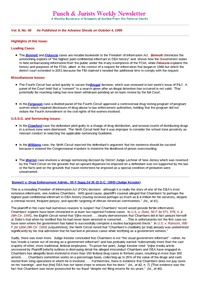This case is noted for its detailed explanation of the history and purposes of the FOIA in the context of a 1986 request for information which the district court rather casually extended to the year 2001 when the record failed to support that delay.
Anyone considering a Freedom …
Here the Court rejected a challenge to a sentence on the grounds that the sentence violated the Congressional mandate set forth in 28 USC § 994(g) that the Guidelines must minimize the likelihood that prison populations will exceed their capacity.
Nice try - but no bacon! In this …
This is an astonishing FOIA case which chronicles the exploits of the highest paid confidential informant in DEA history and shows how the Government then seeks to hide that information from the public under the many exemptions of the FOIA.
This is a revealing Freedom of Information Act …
This is another case that exposes one of the traps of plea-bargaining - being sentenced for counts that are dismissed; but it is particularly noted for a somewhat technical limitation on the use of “relevant conduct.” In this case, the defendant pled guilty to a charge of possession of …
While Rule 608(b) generally forbids proving specific instances of a witness' conduct for the purpose of attacking or supporting the witness' credibility, it does leave the ultimiate decision to the discretion of the trial court if inquiry would be probative of the witness' truthfulness or untruthfulness. In this case, …
In this case, the defendant withdrew his not guilty plea based on the Government's promise to recommend that that he be sentenced under the "safety valve provisions of 18 U.S.C. § 3553(f). However, the defendant had a prior criminal history and his criminal history score was greater than level …
This is a vintage drug-sentencing case emanating from the courtroom of Judge Lechner of New Jersey. The defendant in this case was in Israel on a business trip when he was offered $15,000 to transport drugs into America. He immediately notified the DEA and offered to cooperate with the …
This is a vintage drug-sentencing case emanating from the courtroom of Judge Lechner of New Jersey. The defendant in this case was in Israel on a business trip when he was offered $15,000 to transport drugs into America. He immediately notified the DEA and offered to cooperate with the …
Here the majority held that a sentencing error that kept two prisoners in jail for an extra 12 and 52 months respectively was not a sufficient miscarriage of justice to warrant habeas relief since they had failed to raise the issue on direct appeal.
In this case, the …
Relying on the Supreme Court's decision in Lilly v. Virginia, 119 S.Ct. 1887 (1999), the Court concluded that the statements in question neither fell into a "firmly rooted" exception to the hearsay rule nor possessed sufficient indicia of trustworthiness to be admitted - and its decision contains a good …
This decision deals with a controversial program adopted by the Medical University of South Carolina (MUSC), in consultation with various courts, social service agencies, and law enforcement agencies which was designed “to encourage pregnant women whose urine tested positive for cocaine use to obtain substance abuse counseling.” (Id., at …
Here the Court held that the BOP was well within its discretion in classifying all § 924(c) crimes as violent crimes for the purpose of denying eligibility to prisoners to participate in drug treatment programs that could reduce their sentences.
This is a vintage drug-sentencing case emanating from the courtroom of Judge Lechner of New Jersey. The defendant in this case was in Israel on a business trip when he was offered $15,000 to transport drugs into America. He immediately notified the DEA and offered to cooperate with the …
Here the Court held that the BOP was well within its discretion in classifying all § 924(c) crimes as violent crimes for the purpose of denying eligibility to prisoners to participate in drug treatment programs that could reduce their sentences.
Here the defendant asked the Court to conclude that federal habeas relief is an ineffective remedy because he was denied permission by this court to file a successive § 2255 motion; and that he be allowed to file a habeas petition under § 2241. The Court declined to do …
The Court stated: " It is undisputed that the movants here are widely known and highly respected health care lawyers, and the government has not tried to refute their claim that being labeled as criminal coconspirators injured their reputations. Moreover, the relief the movants request would likely redress the …
This is an astonishing FOIA case which chronicles the exploits of the highest paid confidential informant in DEA history and shows how the Government then seeks to hide that information from the public under the many exemptions of the FOIA.
This is a revealing Freedom of Information Act …
United States v. Worley, 193 F.3d 380 (6th Cir. 1999) (Judge Jones)
United States v. Brugal, 185 F.3d 205 (4th Cir. 1999) (Judge Murnaghan)
It is not surprising that one gets totally confused by the direction of the law on the subject of valid searches under the Fourth Amendment. …
